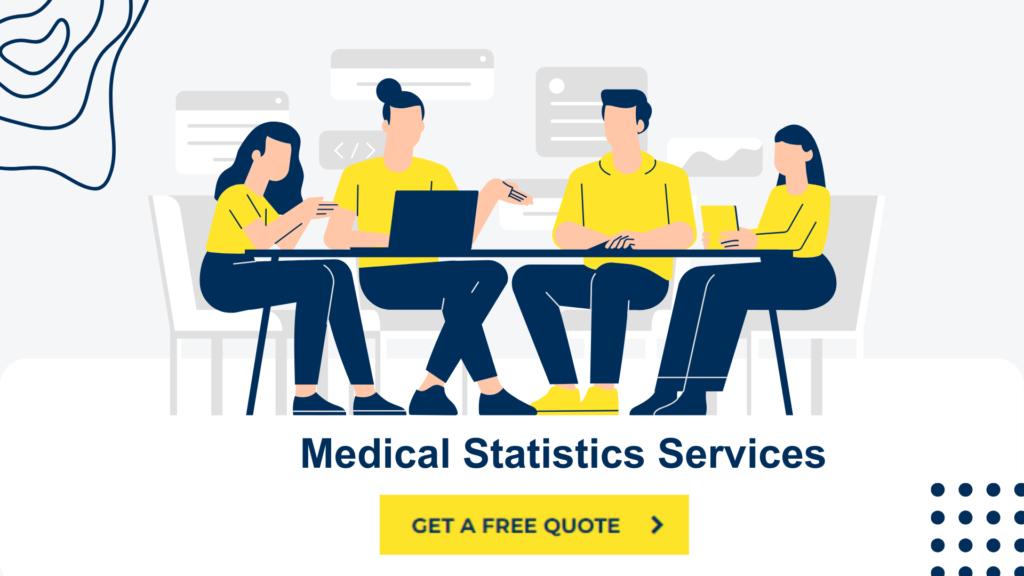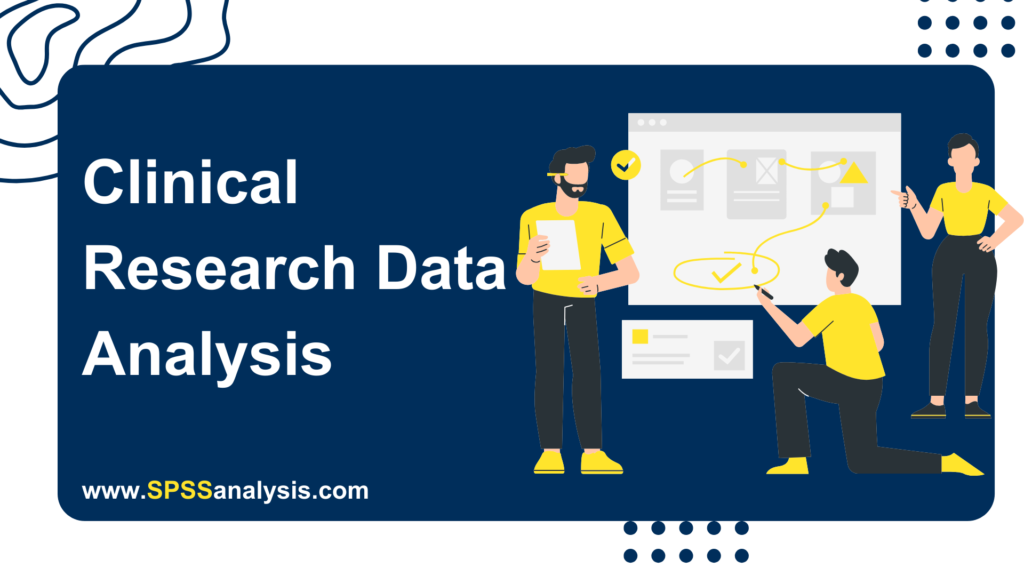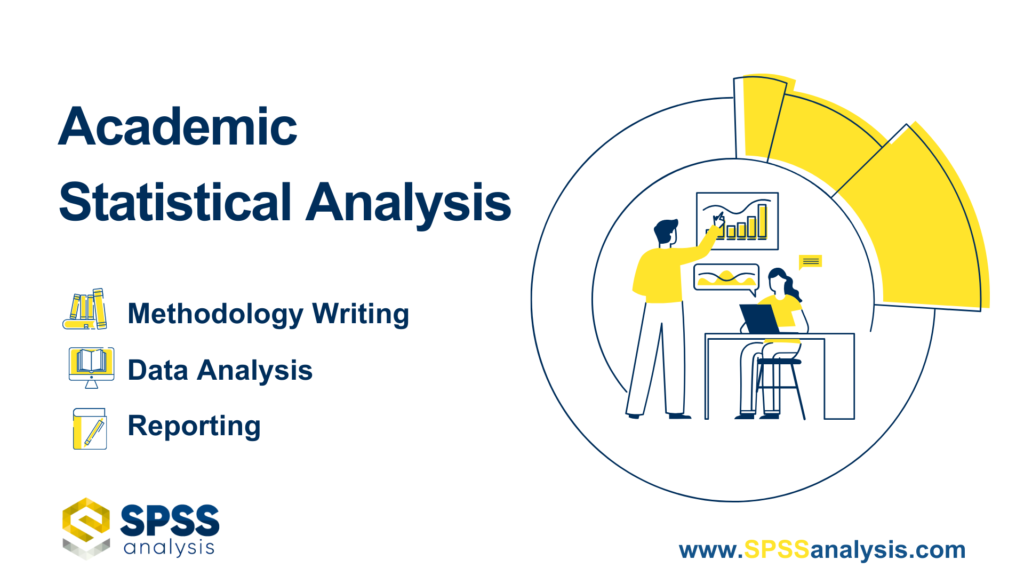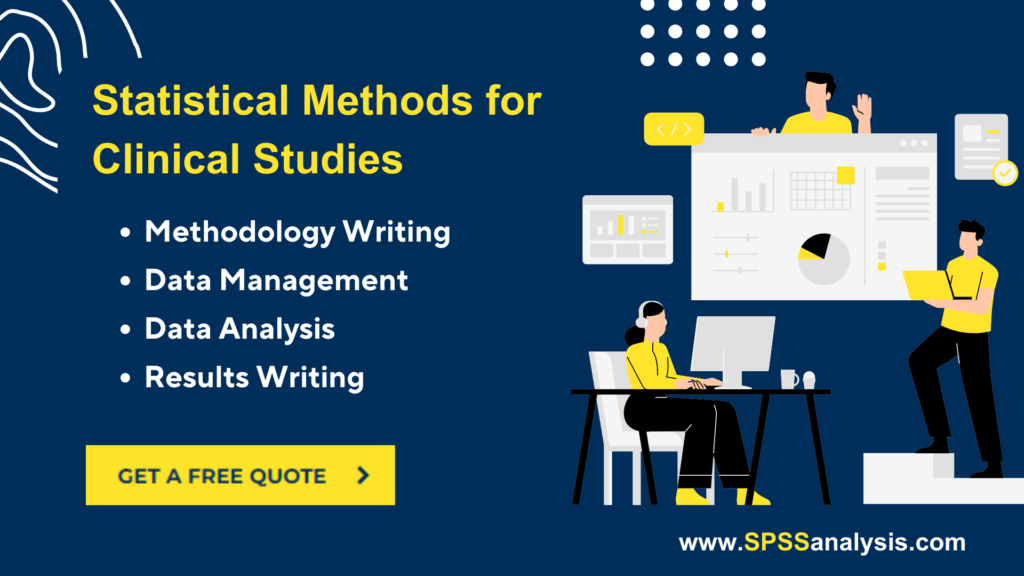Statistical Methods for Clinical Studies
Statistical Methods for Clinical Studies: Elevate Your Research with Our Customized Data Analysis, Methodology, and Reporting Services. Specializing in SPSS, R, STATA, JASP, and More for Comprehensive Assistance.
Top Biostatisticians 👩🔬 | Free Unlimited Revisions 🔄 | NDA-Protected Service 🛡️ | Plagiarism-Free Work 🎓 | On-Time Delivery 🎯 | 24/7 Support 🕒 | Strict Privacy Assured 🔒 | Satisfaction with Every Data Analysis ✅
Our Expertise Recognized by Researchers at Leading Universities:




















Statistical Methods for Clinical Studies
Medical – Clinic – Public Health – Healthcare – Epidemiology – Pharmaceutical: Research Data Analysis is a comprehensive service tailored to meet the specific needs of your research, ensuring that you receive expert support in the following key areas:
- Methodology Writing: We develop a detailed plan for your research approach, outlining the statistical methods to be used in your study. This foundational step ensures that your research is built on a robust methodological framework.
- Data Management: Our services include importing your data into the preferred statistical software, recoding variables to suit analysis requirements, and data cleaning to ensure accuracy and reliability. This process prepares your data for meaningful analysis, setting the stage for insightful findings.
- Data Analysis & Hypothesis Testing: Whether your research calls for quantitative data analysis or qualitative data analysis, our experts are equipped to handle it. We apply appropriate statistical tests for your hypothesis and techniques to analyse your data, uncovering the patterns and insights that support your research objectives.
- Results Writing: We present your findings in a clear and academically rigorous format, adhering to APA, Harvard, or other academic styles as required. This includes preparing tables and graphs that effectively communicate your results, making them accessible to your intended audience.
Let us help you transform raw data into insightful, coherent findings that propel your research forward. Get a Free Quote Now!
Why Choose UsChoosing SPSSanalysis.com for your dissertation statistical analysis comes with a set of clear promises and benefits, designed to ensure your absolute satisfaction and confidence in our services
Experienced Statisticians
Our team comprises PhD-holding statisticians with a minimum of 7+ years of experience in a variety of fields
Privacy Guarantee
We pledge never to share your details or data with any third party, maintaining the anonymity of your project.
Plagiarism-Free Work
We provide work that is completely free from plagiarism, adhering to the highest standards of academic integrity.
On-Time Delivery
We commit to meeting your deadlines, ensuring that your project is completed within the agreed timeframe.
Free Unlimited Revisions
Your satisfaction is our priority. We offer unlimited revisions until your expectations are fully met.
24/7 Support Service
Our support team is available around the clock to answer your questions and provide assistance whenever you need it.
How Statistical Analysis Service Works
1. Introduction
SPSSanalysis.com offers a specialised service for researchers, academics, and PhD students who need support with statistical methods for clinical studies. We simplify the process of obtaining custom statistical analysis, helping you achieve accurate, meaningful results in your research. Our services are tailored to your specific needs, whether you are conducting clinical trials or performing health-related research.
Engaging with us is easy. First, submit your project details via our Get a Free Quote page. We will review your inquiry and send you a personalised project plan, including pricing and deadlines. Once you agree, we handle the statistical analysis and deliver it within the agreed timeframe.
2. What is Clinical Research?
Clinical research involves studies that assess health outcomes by examining medical, behavioural, or therapeutic interventions. These studies aim to determine the safety and efficacy of new treatments, diagnostic tests, and preventive measures. By carefully designing clinical research, investigators can gather valuable data that contribute to improving patient care and public health.
 For clinical research to succeed, it must follow strict guidelines and utilise appropriate statistical methods for clinical studies. Statistics play a crucial role in designing these studies, analysing data, and interpreting results. This helps researchers draw accurate conclusions that impact medical practice and healthcare policies. To receive expert biostatistical support tailored to your research, visit our Get a Free Quote page today.
For clinical research to succeed, it must follow strict guidelines and utilise appropriate statistical methods for clinical studies. Statistics play a crucial role in designing these studies, analysing data, and interpreting results. This helps researchers draw accurate conclusions that impact medical practice and healthcare policies. To receive expert biostatistical support tailored to your research, visit our Get a Free Quote page today.
3. Statistics for Clinical Trials
Statistics are essential in clinical trials because they determine the effectiveness of treatments and medical interventions. In clinical trials, researchers use statistical methods for clinical studies to assess the significance of their findings. These methods ensure that the results are valid, reliable, and applicable to real-world scenarios.
Clinical trials follow specific phases, from early testing to large-scale studies. At each phase, statistical analysis helps evaluate the safety and effectiveness of treatments. For example, hypothesis testing and survival analysis are common techniques used to determine whether a treatment has a significant effect.
- For tailored biostatistical support, visit our Get a Free Quote page to start your collaboration with us.
4. How to Collect Data for Clinical Research
Data collection in clinical research is a meticulous process that involves selecting the right participants, tracking outcomes, and ensuring data quality. Accurate data collection ensures that the analysis using statistical methods for clinical studies is valid and reliable. The type of data you collect—whether from patient records, surveys, or direct measurements—depends on the study design.
Researchers must consider the sample size, control groups, and randomisation techniques to minimise bias. Collecting high-quality data also involves setting clear guidelines for tracking patient outcomes and dealing with missing data. This helps ensure that the results are generalisable and useful for improving healthcare practices.
- Ready to enhance your research with expert help? Visit the Get a Free Quote page to explore your options.
5. Conducting a Clinical Trial
Conducting a clinical trial requires careful planning, including selecting an appropriate design and choosing statistical methods for clinical studies that suit your objectives. Researchers typically begin with defining the study population and specifying the intervention to be tested. Once the trial begins, data collection and monitoring are crucial to ensure patient safety and data integrity.
 During the trial, biostatisticians work alongside researchers to analyse the data at interim points and at the trial’s conclusion. They use advanced statistical techniques, such as survival analysis, to assess the treatment’s effect. Accurate analysis ensures that the trial produces meaningful results that can inform healthcare decisions.
During the trial, biostatisticians work alongside researchers to analyse the data at interim points and at the trial’s conclusion. They use advanced statistical techniques, such as survival analysis, to assess the treatment’s effect. Accurate analysis ensures that the trial produces meaningful results that can inform healthcare decisions.
- To receive expert biostatistical support tailored to your research, visit our Get a Free Quote page today.
6. Statistical Methods for Clinical Studies
Statistical methods for clinical studies are the backbone of analysing data in medical research. These methods range from basic descriptive statistics to advanced modelling techniques, such as logistic regression or survival analysis. Choosing the correct method depends on the study design, the type of data, and the research question.
In clinical studies, commonly used statistical methods include t-tests, ANOVA, and Kaplan-Meier curves for survival data. Biostatisticians ensure that assumptions are met for each method, guiding researchers in selecting the most appropriate technique for their analysis. This helps produce robust, evidence-based conclusions.
7. What are Common Statistical Methods?
In clinical research, several statistical methods are frequently used to evaluate results:
- T-tests: Compare the means of two groups.
- ANOVA: Compares the means of three or more groups.
- Chi-square tests: Assess relationships between categorical variables.
- Logistic regression: Evaluates binary outcomes, such as success or failure of treatment.
- Survival analysis: Analyses time-to-event data, such as time until recovery or death.
Each of these statistical methods for clinical studies has its specific use case and helps researchers interpret their data effectively.
8. What are the Statistical Methods used in Clinical Research?
Statistical methods for clinical studies are essential in clinical research for assessing the efficacy of treatments and interventions. Commonly used methods include:
- Cox proportional hazards models: Analyses survival data while adjusting for covariates.
- Mixed-effects models: Handles repeated measurements from clinical trials.
- Bayesian methods: Provides a probabilistic framework for making inferences based on prior data.
Selecting the right statistical method is critical to ensuring the success of your clinical study. Biostatisticians work closely with researchers to identify the appropriate techniques that align with their study design and objectives.

9. Study Design and Choosing a Statistical Test For Clinical Research
Choosing the right study design is crucial for ensuring that your clinical research produces valid results. Common designs include randomised controlled trials (RCTs), cohort studies, and case-control studies. Once you choose your design, the next step is selecting the appropriate statistical methods for clinical studies to analyse your data.
For example, RCTs often use t-tests or ANOVA for comparing group means, while survival studies might use Kaplan-Meier estimates or Cox regression. A biostatistician can guide you through this process, ensuring that your analysis accurately reflects the research question and study design.
10. Clinical Trial Statistical Analysis
Statistical analysis is integral to the success of clinical trials. Once the data has been collected, applying the right statistical methods for clinical studies ensures accurate and meaningful results. Biostatisticians perform various types of analyses, from simple comparisons between groups to advanced multivariable models.
 Key statistical methods in clinical trials include survival analysis, logistic regression, and mixed-effects models. These methods help researchers assess treatment efficacy, account for missing data, and make inferences about population-wide effects. Accurate statistical analysis ensures that the trial’s findings are robust and reliable.
Key statistical methods in clinical trials include survival analysis, logistic regression, and mixed-effects models. These methods help researchers assess treatment efficacy, account for missing data, and make inferences about population-wide effects. Accurate statistical analysis ensures that the trial’s findings are robust and reliable.
- Need help choosing the right software for your analysis? Go to the Get a Free Quote page, and our experts will guide you.
11. Find a Biostatistical Modelling Expert
If you need expert support for your clinical research, finding a biostatistical modelling expert is essential. They can guide you in choosing the right statistical methods for clinical studies and ensure that your data is analysed accurately. Start by visiting the Get a Free Quote page to outline your project needs, and our expert team will review your request.
Whether you need help designing your study or analysing complex datasets, a biostatistician will work closely with you to deliver results that meet the highest academic and research standards.
12. Hiring a Biostatistician
Hiring a biostatistician ensures that your clinical study follows the best practices in data analysis. They provide expert advice on study design, data collection, and statistical methods for clinical studies, ensuring that your research produces valid and reliable results. Whether you are conducting a small-scale study or a large clinical trial, their expertise is invaluable.
To hire a biostatistician, visit our Get a Free Quote page, and provide details about your project. Our experienced team will guide you through the process and offer tailored support to meet your specific needs.
13. Get a Biostatistical Support for Your Research
Do you need help with statistical methods for clinical studies? Our team of expert biostatisticians is ready to assist you. Whether you need help with data analysis, study design, or statistical software, we provide comprehensive support to ensure your research meets the highest standards.
For tailored biostatistical support, visit our Get a Free Quote page. Let us know your research needs, and we will develop a plan that fits your project’s objectives and timeline.
Why Researchers Should Get Data Analysis Help
Researchers or Students should consider getting data analysis help for several reasons:
- Complexity of Data: Navigating complex datasets can be challenging without expert guidance.
- Statistical Accuracy: Ensuring the correct application of statistical tests and interpretations.
- Time Efficiency: Saving time and focusing on other aspects of their research.
- Skill Development: Enhancing their statistical analysis skills for future research projects.
Data analysis help can significantly improve the quality of research, leading to more meaningful and impactful findings. Get a FREE Quote Now!
Stay connected with SPSSanalysis.com on LinkedIn for the latest updates and insights!






